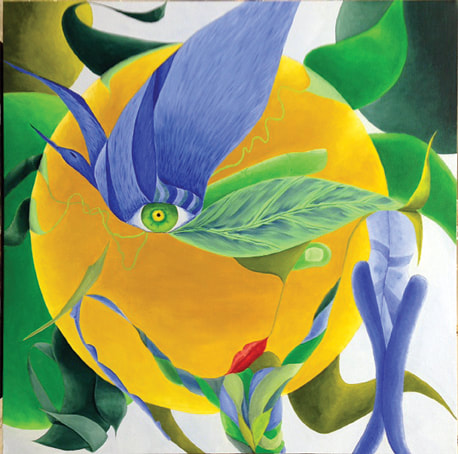|
Jozef Piotr Pawlikowski was born in Iquitos, a small town in the Peruvian Amazon. When he was a child, the Amazon River ran under the city’s main street. He remembers flooding so heavy that “the river swept away like a block and a half of the city.” Hoping to avert further catastrophes, he says, people of the city built flood-control barriers, but the river carried them away also. So they decided to divert it. The Amazon still runs very close to the city, but no longer destroys it.
Jozef spent his first 16 years in this place of constant negotiation with nature. Later he moved to Lima to study at the university. This was during the 1980s, when terrorism ravaged Peru. Jozef says: “There was a lot of violence, and then came the economic crisis.” Jozef’s expression turns dark. “I lived through a couple of terrifying experiences and decided to return to Iquitos.” Back at home, he worked at his mother’s restaurant. Since his childhood he had painted at the slightest provocation, but it was during this reunion with the jungle that he sold his first works. Jozef says he used to hang his paintings in the restaurant. “The people who arrived appreciated them and sometimes bought them.” But love would soon take Jozef far away. In the Amazon, he managed the family’s fleet of tourboats. On La Turquesa, surrounded by his friend the jungle, he met Shelly, who was born in Anchorage. After several international visits they married, and Jozef exchanged the heat of the tropics for boreal ice. With his experience in the hospitality industry, Jozef started work in an Anchorage hotel. Soon after, he secured a second job in a retail store. “I was busy all the time. I did not find space for the university, or to paint.” After some years, Shelly urged him to retake both academic and art worlds. “Then I started to study Arts and Sciences in UAA.” Jozef had already studied psychology at Ricardo Palma University. So he became interested in linking his two worlds, and he hopes to one day offer art therapy. “I like to convey some kind of alternative, so that people can see that they can always find a way. At all times we are surrounded by problems, but the experience of art lets us see that there is always an exit,” explains the painter. And he adds that for him, art “has always been an outlet.” He even says that as a child when he felt troubled he liked to “scribble his thoughts.” “For my sketches and for my doodles I use only a pen,” says Jozef when asked about his techniques. “Now I work in acrylic and oil. Previously I mixed watercolor with tempera, and even automotive enamels, colored sandpaper, and ink.” At first sight, it might seem that the experience of painting in Alaska is very different from that of the Amazon. But Jozef found in this corner of the continent “the tranquility of my city when I was a child.” He says that “people of the jungle, like any society, may suddenly show themselves in a chaotic way.” Because of that natural chaos, “the Amazon has been abandoned by successive governments of Peru. It has grown disorganized. It has become overwhelming. It became a land of drug cartels.” Everyday life is now very different from that of the jungle of his childhood. By comparison, Alaska looks like a “peaceful and inspiring” place. And this calm allows Jozef to evoke his personal jungle: in a recent collective show at the Alaska Humanities Forum he exhibited a series of pieces in which he painted “touches of the Amazon, such as the flowers known as royal victories and tropical fruits mixed with ceramics of the Shipibo, a native tribe of the region.” But in his paintings on the jungle you hear not only the echoes of nostalgia. There is also a battle cry in them. “I always paint pieces that speak of man in his relationship with the environment. I want to talk about the link with nature as a social issue. I am worried about climate change, large-scale logging of the jungle, and environmental problems generated by companies exploiting poor countries.” Jozef uses this question to bridge the Amazon and the Arctic, two regions of the planet quite devastated by human predation. |
